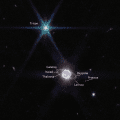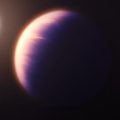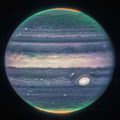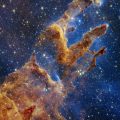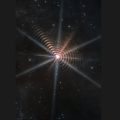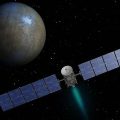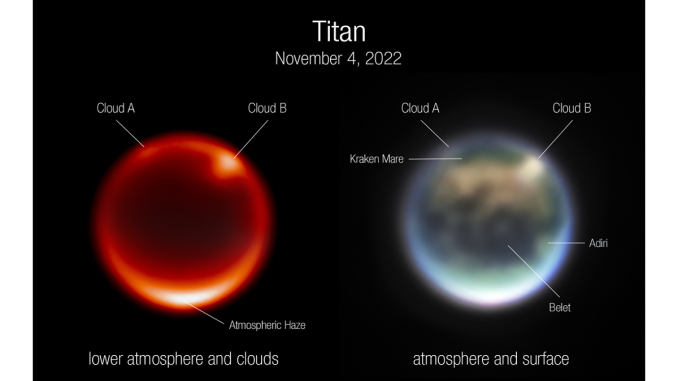
. Titan holds immense significance among astronomers because they believe its atmosphere can tell much about the Moon’s past and future.
Scientists have waited for years to study the atmosphere of Titan, and their dream has come true thanks to the James Webb Space Telescope. Titan is Saturn’s largest Moon and the only planetary body other than Earth with rivers, lakes, and seas. These lakes and rivers, however, do not have water; what flows in them are hydrocarbons, including methane and ethane.
In addition, Titan has an atmosphere filled with a thick haze that obscures visible light reflecting off the surface, and that is where Webb comes in. NASA has now used Webb’s infrared capabilities to study Titan’s atmosphere, including its weather patterns and gaseous composition, and also see through the haze to see bright and dark patches on its surface.
A Titan-ic success!
Here is Webb’s first look at Saturn’s largest moon, Titan. Because Titan has a dense atmosphere, its surface is hidden in visible light. Enter Webb’s infrared eye, which captured clouds as well as bright & dark patches on its surface: https://t.co/zQsSN9Py4H pic.twitter.com/6NuQMfXAFN
— NASA Webb Telescope (@NASAWebb) December 1, 2022
Peering into Titan
Using the Webb telescope’s Near-Infrared Camera (NIRCam), the scientists discovered a large cloud in Titan’s northern hemisphere and soon confirmed the presence of a second one. Astronomers say clouds validate long-held predictions from computer models about Titan’s climate and would form readily in the mid-northern hemisphere during its late summertime when the sun heats the surface.
Conor Nixon is leading the team of astronomers from NASA’s Goddard Space Flight Centre, who wrote to his team members, “There appears to be a large cloud, we believe, over the northern polar region near Kraken Mare” in a mail.
After spotting clouds in Titan’s atmosphere, the astronomers then used the Keck Observatory in Hawai’i to compare the evolution of the shadows in two days.
In the images above (which are blurry due to Titan’s dense atmosphere), NASA explained, “Cloud A appears to be rotating into view while Cloud B appears to be either dissipating or moving behind Titan’s limb (around toward the hemisphere facing away from us)”.

